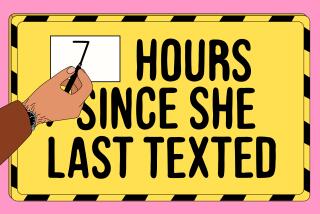In survey, 88% of U.S. adults said they had sexted and 96% of them endorsed it

Four out of five American adults have sent or received sexual text messages or photos on their phones in the last year, a new study reveals.
- Share via
If you’ve ever sent racy text messages or revealing selfies to your sweetie, you’re not alone. More than 4 out of 5 adults in a new study reported sexting – that is, sending or receiving sexually explicit text messages or pictures on their phones – in the last year. And they were glad they did.
“Sexting is a prevalent behavior that adults engage in for a variety of reasons,” wrote study authors Emily Stasko, a doctoral student in psychology at Drexel University, and Pamela A. Geller, a professor who runs the Women’s Health Psychology Lab at Drexel. “These findings indicate a robust relationship between sexting and sexual satisfaction.”
To get a clearer picture of the state of sexting among American adults, Stasko and Geller enlisted 870 heterosexual adults to answer an online survey about sexting. The participants ranged in age between 18 and 82, with an average age of 35. The survey takers were recruited through the Internet site Amazon Mechanical Turk, and whites and women were overrepresented compared with the U.S. population as a whole.
The survey revealed that 88% of the respondents had sexted at least once in their lives and that 82% had done so in the last year. What’s more, 96% of these sexters said they endorsed the practice.
Stasko and Geller reported that 74% of survey-takers said they texted with a partner in a committed relationship, 43% had texted a partner in a casual relationship, and 12% had texted someone “in a cheating relationship.”
Among all the self-reported sexters in the study, about three-quarters of them said they usually sexted from home. However, almost 30% said they had sexted from work or while they were “out and about.”
Sexting appeared to play an important role in the lives of survey-takers who were not in “very committed” relationships. For these relatively unattached people, those who sexted reported higher levels of sexual satisfaction than their counterparts who refrained from the practice.
Among people who were in “very committed” relationships, the Drexel researchers found no link between sexting and sexual satisfaction.
The results were to be presented Saturday at the American Psychological Assn.’s annual conference in Toronto.
While previous research has focused on the potential health risks of sexting, this study highlights the fact that sexting may have a positive role in helping adult sexual partners communicate.
“I actually recommend sexting — particularly the texting part of sexting — for [couples] to show desire for each other,” said Patti Britton, a clinical sexologist and interim dean of the Institute for Advanced Study of Human Sexuality in San Francisco.
“I use it as a homework assignment, when I have couples who are stale or their relationship is what I would call ‘sexually dead on arrival,’” said Britton, who wasn’t involved in the new study. “Using the online world creates a way for them to find steppingstones or building blocks to reconnect in an erotic or a sexual way.”
Though the study combines racy text messages and explicit photos into one sexting category, Britton and other experts say there are critical differences between the two.
Michelle Drouin, a developmental psychologist at Indiana University–Purdue University Fort Wayne who wasn’t involved in the study either, said a lot could go wrong if you sext with pictures instead of just words.
“It could be intercepted. Your cellphone could be hacked. If one day you want to run for office, this picture could surface,” she said.
In fact, nearly a quarter of adults who receive provocative photo messages wind up sharing them with an average of three other people, according to recent research by Amanda Gesselman of the Kinsey Institute.
The new study doesn’t indicate whether the sexters who are more sexually satisfied are actually happy with their sexting partners or just happier with their sex lives in general, Drouin said.
“I might be a woman who is sexually satisfied, and I might be sending lots of pictures,” she said. “But it doesn’t say that I’m sexually satisfied within my current partnership.”
In general, Drouin said, sexting tends to be associated with less healthful relationship characteristics, like attachment anxiety. For example, adults may send sexts because they’re afraid their partner will leave if they don’t. Or, they may sext instead of speaking face-to-face or physically touching because it allows them to maintain emotional distance, she said.
“The people who are having actual sex are probably a lot more satisfied than the people who are sending these pictures,” she said.
For more science news, follow me on Twitter @sasha_hl and “like” Los Angeles Times Science & Health on Facebook.
ALSO:
Sexting may be the new normal for many teens, researchers say
OPINION: Ending the national panic on ‘sexting’
Sexting in middle school linked with real-life sex, study finds






